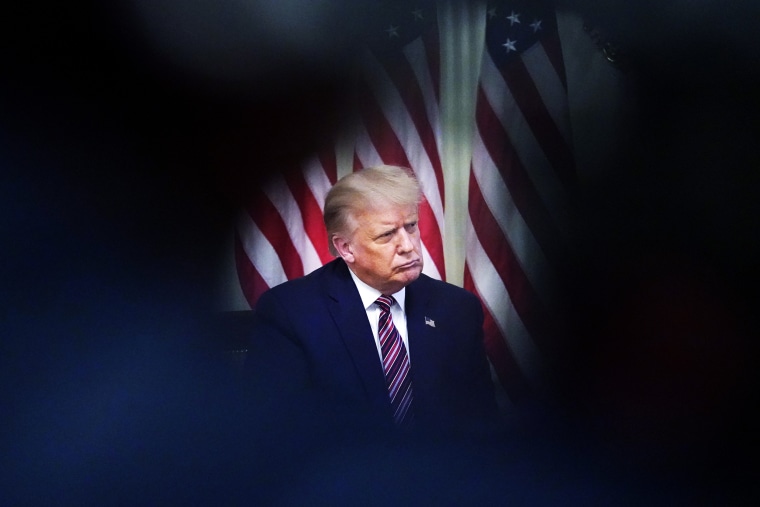With the indictment of Donald Trump by a New York state grand jury, a legal barrier has been broken. A maiden legal voyage has set sail. The most important takeaway is this: A president of the United States will never again rest comfortably in the belief that he or she can commit crimes with impunity. This is an important development for our republic.
Our nation has long suffered from the absence of accountability for presidential crimes. Most notably, President Gerald Ford decided that former President Richard Nixon should not be held accountable for his crimes in office. Ford claimed his decision was for the good of the country, to help the country heal. This reasoning always struck me, as a career prosecutor, as a cruel joke. In 30 years, I never once told crime victims that I was going to help them heal by declining to prosecute the perpetrators. Announcing that you are declining to prosecute crime in the name of healing is a perversion of justice.
A president of the United States will never again rest comfortably in the belief that he or she can commit crimes with impunity.
Of course, an indictment is only the first step toward accountability. Enormous challenges lie ahead. Trump’s legal team undoubtedly will wage a scorched-earth defense. And outside the court of law, we can expect Trump loyalists to wage battles in the court of public opinion, most likely deploying both facts and alternative facts. America cannot yet breathe easy, as justice is still well off on the horizon.
Another likely consequence of this precedent-setting indictment is that it increases the odds that additional indictments will follow. I have long maintained that no prosecutor wants to be the first to charge a former president of the United States. As we are seeing now, the first indictment attracts the white-hot glare of media attention from around the world.
And some of that attention can be downright dangerous. We cannot ignore that Trump and many of his associates have unleashed a level of hate and violence once thought impossible (or at least unacceptable) in a civilized society. With entreaties to his supporters such as “fight like hell or you won’t have a country anymore,” Trump has made violence in the quest for power not just acceptable but fashionable.
One only need look to the reporting by the Atlanta Journal-Constitution about how, on the day former national security adviser Michael Flynn testified before the Georgia state grand jury investigating Trump’s election crimes, law enforcement authorities brought in a “bomb-sniffing dog” and the Fulton County courthouse was guarded by “sheriff’s deputies and marshals carrying automatic weapons.” The prospect of violence coming to jurisdictions and to prosecution teams who pursue criminal charges against Trump cannot be ignored.
Prosecutors are not monolithic, but we do tend to be a fairly competitive bunch. I have seen a phenomenon that becomes relevant here when defendants commit crimes in multiple jurisdictions. Once prosecutors in one jurisdiction bring charges, prosecutors in other involved jurisdictions will often feel a greater sense of urgency to indict the same defendant to address the crimes committed in their jurisdictional backyards. This is not only human nature: Prosecutors also have constituents to whom they are responsible. This is most directly at play for district attorneys who face the prospect of running for re-election. Federal prosecutors are not elected, but, in a very real sense, they represent the interests of the American people in criminal prosecutions.
An indictment is never a celebratory affair. It is simply a necessary step on the road to justice.
Based on public reporting alone, prosecutors in other jurisdictions — Fulton County, Georgia, and the federal inquiries under special prosecutor Jack Smith — have ample evidence to charge Trump. Recall, for example, that a federal judge in California, David Carter, ruled there was enough evidence to conclude that Trump and lawyer John Eastman committed two federal felonies in trying to challenge the 2020 election results: obstructing an official congressional proceeding and conspiracy to defraud the United States. The New York indictment will ratchet up the pressure on federal prosecutors and prosecutors in Georgia, including Fulton County District Attorney Fani Willis, to hold Trump accountable for the crimes he seems to have committed in their jurisdictions.
An indictment is never a celebratory affair. It is simply a necessary step on the road to justice. But the indictment of a former president of the United States will send a necessary message, a powerful message, indeed a potentially democracy-saving message: Gone are the days when presidents are given carte blanche to commit crimes with impunity. This historic development is a move toward fulfilling the words of what had begun to feel like a hollow promise, that no man is above the law. Today’s indictment prods that mantra into wakefulness and provides some modicum of hope for a resurgence of accountability for the crimes of a former president.

